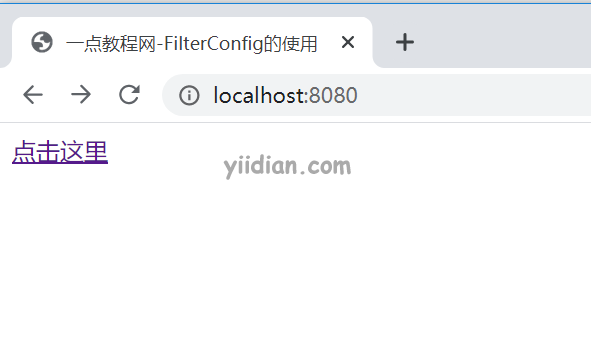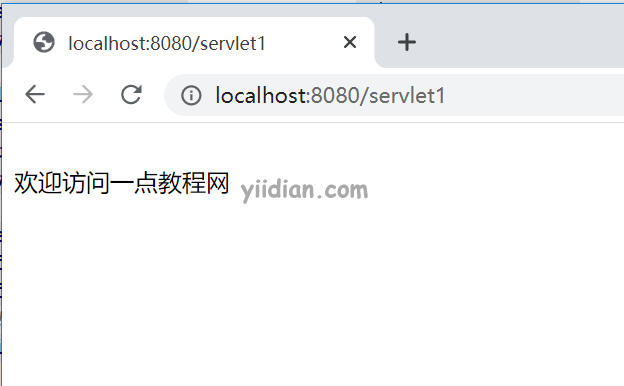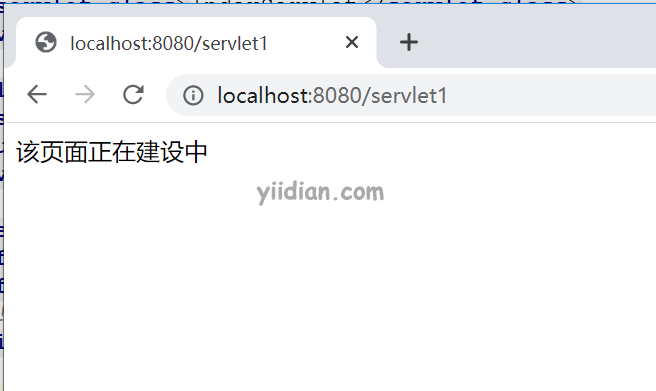FilterConfig的使用
Web容器创建FilterConfig的对象。该对象可用于从web.xml文件获取Filter的配置信息。
1 FilterConfig接口的方法
FilterConfig接口中有以下4个方法:
- public void init(FilterConfig config):仅在用于初始化过滤器时才调用init()方法。
- public String getInitParameter(String parameterName):返回指定参数名称的参数值。
- public java.util.Enumeration getInitParameterNames():返回包含所有参数名称的枚举。
- public ServletContext getServletContext():返回ServletContext对象。
2 FilterConfig的案例
在下面的示例中,流程大致是:MyFilter过滤器会读取param-value的值,如果将param-value是no,则请求将被转发到IndexServlet,如果是yes则提示信息:“该页面正在建设中”。
2.1 编写页面
index.jsp:
<%@ page contentType="text/html;charset=UTF-8" language="java" %>
<html>
<head>
<meta charset="UTF-8">
<title>一点教程网-FilterConfig的使用</title>
<meta http-equiv="content-type" content="text/html" charset="UTF-8">
</head>
<body>
<a href="servlet1">点击这里</a>
</body>
</html>
2.2 编写IndexServlet
import java.io.*;
import javax.servlet.*;
import javax.servlet.http.*;
/**
* 一点教程网 - http://www.yiidian.com
*/
public class IndexServlet extends HttpServlet{
public void doGet(HttpServletRequest req,HttpServletResponse res)
throws ServletException,IOException
{
res.setContentType("text/html;charset=utf-8");
PrintWriter out = res.getWriter();
out.print("<br>欢迎访问一点教程网<br>");
}
}
2.3 编写MyFilter
import javax.servlet.*;
import java.io.IOException;
import java.io.PrintWriter;
/**
*一点教程网 - http://www.yiidian.com
*/
public class MyFilter implements Filter {
FilterConfig config;
public void init(FilterConfig config) throws ServletException {
this.config=config;
}
public void doFilter(ServletRequest req, ServletResponse resp,
FilterChain chain) throws IOException, ServletException {
resp.setContentType("text/html;charset=utf-8");
PrintWriter out=resp.getWriter();
String s=config.getInitParameter("construction");
if(s.equals("yes")){
out.print("该页面正在建设中");
}
else{
chain.doFilter(req, resp);//放行请求
}
}
public void destroy() {
}
}
2.4 配置web.xml
<?xml version="1.0" encoding="UTF-8"?>
<web-app xmlns="http://xmlns.jcp.org/xml/ns/javaee"
xmlns:xsi="http://www.w3.org/2001/XMLSchema-instance"
xsi:schemaLocation="http://xmlns.jcp.org/xml/ns/javaee http://xmlns.jcp.org/xml/ns/javaee/web-app_3_1.xsd"
version="3.1">
<servlet>
<servlet-name>IndexServlet</servlet-name>
<servlet-class>IndexServlet</servlet-class>
</servlet>
<servlet-mapping>
<servlet-name>IndexServlet</servlet-name>
<url-pattern>/servlet1</url-pattern>
</servlet-mapping>
<filter>
<filter-name>MyFilter</filter-name>
<filter-class>MyFilter</filter-class>
<!--Filter的参数-->
<init-param>
<param-name>construction</param-name>
<param-value>no</param-value>
</init-param>
</filter>
<filter-mapping>
<filter-name>MyFilter</filter-name>
<url-pattern>/servlet1</url-pattern>
</filter-mapping>
</web-app>
2.5 运行测试

如果param-value的值为no,显示如下:

如果param-value值为yes,显示如下:

热门文章
优秀文章


